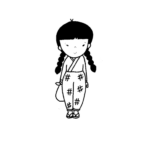- What do you like about Canada?
- When and why did you come to Canada?
- What did you do for a living?
- Please tell us about your work at Air Canada.
- What do you like to do?
- What was the most difficult thing about living in Canada?
- What is your personal motto or what do you usually keep in mind?
- Is there anything you would like to do in the future?
- Message to Japanese women living in Canada
- Editor’s Comment
What do you like about Canada?
Freedom. There is no expectation that you have a certain way according to your age or gender. For example, another Japanese woman told me that I shouldn’t wear knee length skirts anymore at work because of my age. Also, Japanese relatives told me that I should sit on my heels (seiza) when I sit down because I am a woman. My mother, who is of a more traditional generation, repeatedly told me to be patient because she cares about what other people think about me. In Canada, I feel free as I can live without worrying about others’ opinions about me.

When and why did you come to Canada?
In Japan, I was working as an administrative assistant at an international school. I had been studying English and was always interested in going abroad. One of my friends had already come to Vancouver before me so I decided to come here too for a year on a working holiday program. At first, I missed my parents and friends and cried a lot. Now I have been in Canada for 29 years.
What did you do for a living?
At first I worked as a concierge at a Japanese-owned hotel in Downtown for three months then I worked as a secretary in their head office. After that, I worked as an inbound worker for a travel agency, making hotel reservations and bus arrangements, before becoming a flight attendant for Air Canada.

Please tell us about your work at Air Canada.
I have been working as a flight attendant for Air Canada for 27 years. I finally reached a mid-level seniority. The most senior flight attendant has been flying for over 50 years. Because they no longer have a mandatory retirement age, there is a crew member who will be 80 years old soon. You can work as long as you wish for at our company. Since we are in a union, seniority is given priority and we have decent benefits . The longer you work there, the more days of the week and routes you can choose, so you can build your own schedule and some people only work half the month. If you are senior enough, you will have the advantage of working occasionally, enjoying good food wherever you go, working with friendly colleagues, and still have free time at home when you return.
This job suits anyone if you can bear the time difference and have a second or third language and love to serve the passengers. Having extra languages can be to your advantage, so I studied Mandarin. If you pass the company’s test, you will be able to fly where that language skill is needed. However, we have to take the company’s language exam every two years so I have to study before every exam. Since I am paid by the hour, I can choose my own route and schedule depending on the number of hours I need to fulfill, which gives me more options and freedom in my schedule. Thanks to my seniority I have been able to take time off when I want to, after working for so many years.
Since joining Air Canada, I have had the opportunity to work with not only Japanese people but also people of different ages and backgrounds, and it has helped me to become more social. It also gave me confidence that I can be financially independent.
I believe this is a job that suits me very well.

How many flights do you have per month?
Before COVID, I used to fly to China, Japan, or Korea for 3 to 4 times a month. Luckily I was not affected by layoffs during the pandemic, but around 7,000 of our 10,000 flight attendants were laid off due to the COVID. They were all recalled in November 2021. The economy is coming back, so we started to have more flights to Europe and South America. Once I leave for work, sometimes I won’t be able to come home for five to six days. Since we don’t have any other family members who can help us in Vancouver, my husband and I manage to arrange between us the picking up and dropping off our daughter for school and her after school activities.
How long did you study Mandarin?
It took me eight years in total to pass the company exam because I had to quit halfway through. I started studying it because it was suggested that I speak another language in order to get this job. But because I studied sloppily and failed the exam, I experienced some frustration. Still, I pushed myself to learn so that I could have a better schedule at work.
What do you like to do?
I like to watch Korean dramas. I now prefer suspense dramas rather than love stories.
I also try to look after my body since my job requires physical work. I used to learn flamenco. When I started flamenco, I realized the importance and enjoyment of having time to myself.

What was the most difficult thing about living in Canada?
It took me a long time to find long term friends. It’s not always because you’re Japanese that you get along with them, and even if you think you get along with them, after 5 or 10 years things change. During the last 30 years I lived here, there were people who came and went but the people who still stayed by my side are the ones I respect.
What is your personal motto or what do you usually keep in mind?
Never preach to others! I try not to act like a know-it-all or say things from the top. Even if I’m giving advice that I think is good, the other person may not think it’s good. I try to be careful based on my past experience.
I also try to avoid speaking negative words. From my past experiences, I feel that things have turned out for the better if I make an effort to look at things positively.
Is there anything you would like to do in the future?
Keep passing Chinese language exams at work every two years to stimulate my brain.. Also, I would love to stop bickering with my husband in front of our daughter (LOL). I would like to keep growing as a person. I still notice my own drawbacks every day but I don’t want to stop recognizing them. I would like to be the one who notices my own shortcomings.

Message to Japanese women living in Canada
When I look at the women around me, I feel that people who make an effort or challenge something have always borne fruit, and that the act of making an effort will nurture you and lead you to a new path. It may not lead you to where you think you want to go right away, but the perseverance and hard work you develop there will lead you to other places, and the people you meet there will become your connections later. You may find something new tomorrow and after going through the twists and turns of my own life, I once again believe that it is important to look forward and not look back.
Especially when I joined Air Canada, I experienced that I was treated equally regardless of my age, gender, nationality or background. Everyone is equal and they also have ups and downs but continue their efforts. I am absolutely blessed to be in an environment where I have colleagues who continue studying and making an effort. That’s why I also studied Mandarin.
If there are people who are struggling to find a job after moving to Canada, I hope they will try something new. Even if it doesn’t lead to your goal right away, you learn something from it and recognize it later. I would like you to find yourself, not as a wife, not as a mother but just yourself. Then you might be able to see the shape in which you would like to be.
Thank you for your time!
Editor’s Comment
Nenah has worked for a large Canadian company for many years. She gave me the impression of an independent woman.
It is not easy to start building a foundation for your life from scratch in a new place. I believe there are some people whose education and career in Japan have become completely meaningless after moving to Canada. It is easy to get caught up in the “things you have to do” in front of you, but I think that by making time to be “me”, not a wife, mother, or anyone else as Nenah said, we will be able to see “what you do and what you want to do”. Nenah taught me that if you are wondering how you should make a living, the first step is to take action, and that will be a big step.











